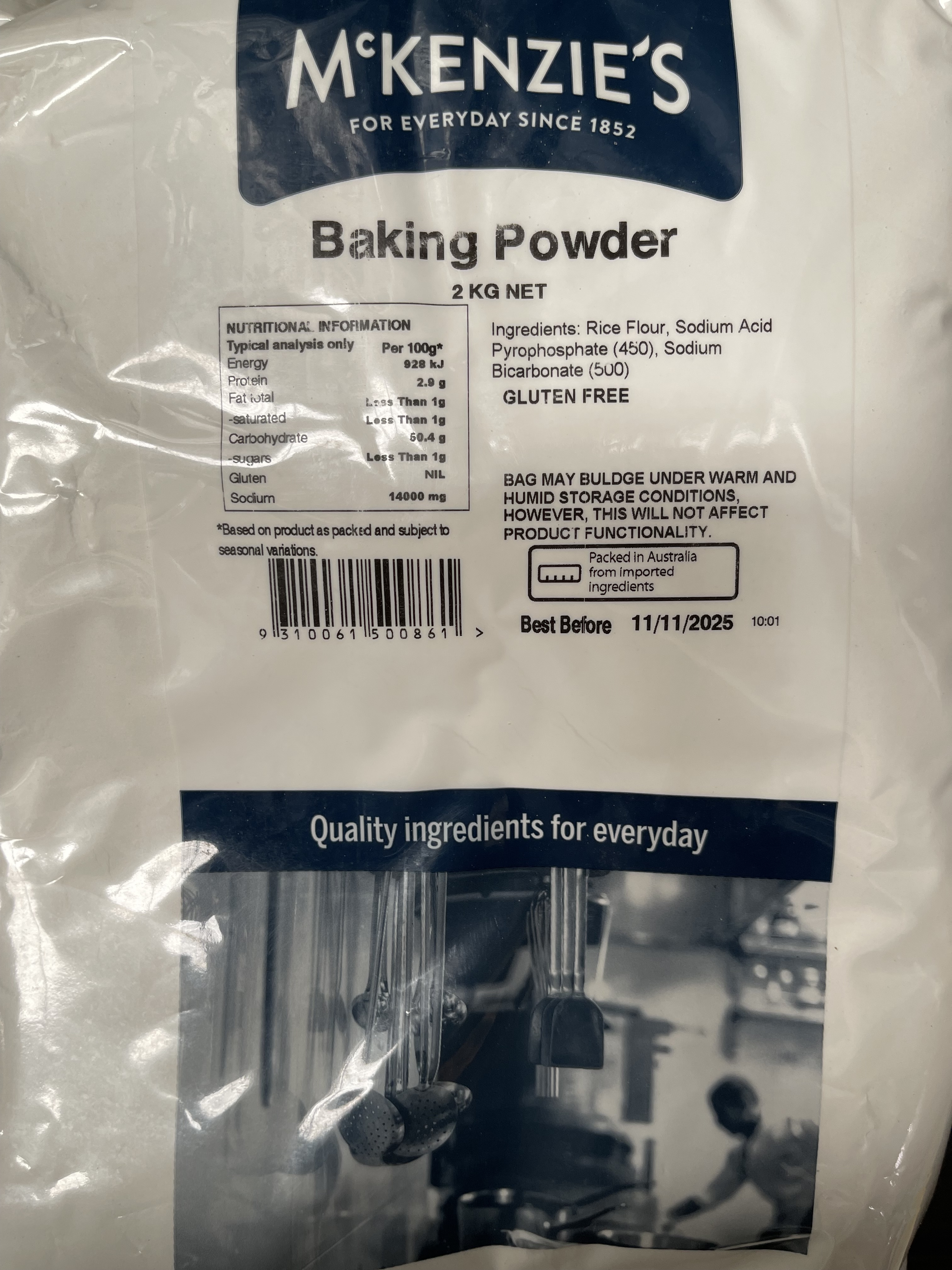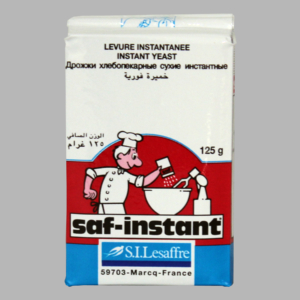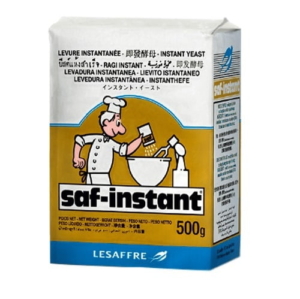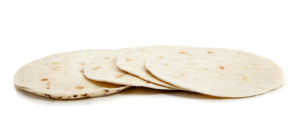MCKENZIES Baking Powder 2kg – Gluten-Free
MCKENZIES Baking Powder is an effective raising agent, specially developed to give your baked goods the perfect lift every time. This 2kg pack is not only ideal for home bakers but also a great choice for commercial kitchens, ensuring you have a consistent supply of quality baking powder.
Key Features:
- Gluten-Free: Safe for those with gluten sensitivities or celiac disease, without compromising on performance.
- Original Ward’s Formula: A trusted formula that has been delivering consistent results for years.
- Versatile Usage: An essential ingredient in a wide variety of baked goods, including cakes, biscuits, breads, and more.
Hot Tips:
- Avoid Overuse: Do not be tempted to add more baking powder than your recipe suggests. Excessive amounts can cause a bitter taste and lead to over-rising, which may cause the mixture to deflate.
- Making Self-Raising Flour: To make self-raising flour, mix two teaspoons of MCKENZIES Baking Powder with each cup of plain flour, then sift several times for even distribution.
- Explore More: In addition to baking powder, MCKENZIES offers a range of other baking aids, including arrowroot, to complement your baking needs.
Ingredients:
- Rice Flour
- Sodium Acid Pyrophosphate (450)
- Sodium Bicarbonate (500)
Nutritional Information:
- Servings Per Package: 25
- Serving Size: 5g
| Item | Per Serving | Per 100g |
|---|
| Energy | 46 kJ | 928 kJ |
| Protein | Less than 1g | 2.9g |
| Fat | Less than 1g | Less than 1g |
| Fat – Saturated | Less than 1g | Less than 1g |
| Carbohydrate | 2.5g | 50.4g |
| Carbohydrate – Sugars | Less than 1g | Less than 1g |
| Sodium | 700mg | 14000mg |
| Gluten | Nil | Nil |
Country of Origin: Packed in Australia from imported ingredients.
Baking Powder: A Key Ingredient for Perfectly Leavened Baked Goods
Baking powder is a versatile and essential ingredient in the culinary world, particularly in baking. It is a chemical leavening agent, meaning it helps baked goods rise by producing carbon dioxide gas when it reacts with moisture and heat. This reaction creates bubbles within the dough or batter, resulting in a light, fluffy texture. Whether you're making cakes, cookies, breads, or muffins, baking powder is often the secret to achieving that perfect rise and soft crumb.
What is Baking Powder?
Baking powder is typically composed of three main ingredients: an acid (usually cream of tartar or sodium acid pyrophosphate), a base (sodium bicarbonate, commonly known as baking soda), and a filler like cornstarch or rice flour to absorb moisture and prevent premature activation. The acid and base components react when mixed with liquid and heated, releasing carbon dioxide gas. This gas forms tiny bubbles in the dough or batter, which expand during baking, causing the mixture to rise.
Types of Baking Powder
There are generally two types of baking powder:
- Single-Acting Baking Powder: Reacts with moisture and needs to be baked immediately after mixing. It is not as commonly used in home baking due to the necessity of quick baking after adding liquids.
- Double-Acting Baking Powder: The most commonly used type in kitchens today, double-acting baking powder reacts in two phases: once when mixed with liquid and again when exposed to heat. This allows more flexibility, as the batter or dough can sit for a while before baking without losing its leavening power.
Uses of Baking Powder
**1. Cakes and Muffins: Baking powder is a key ingredient in many cake and muffin recipes. It helps these baked goods achieve a light, airy texture by providing the necessary lift. Without it, cakes would be dense and heavy.
**2. Biscuits and Scones: For flaky, tender biscuits and scones, baking powder is essential. It helps the dough rise quickly in the oven, creating layers and a soft, tender crumb.
**3. Quick Breads: Unlike traditional yeast-leavened breads, quick breads rely on baking powder for rising. This includes banana bread, zucchini bread, and other similar recipes that don't require proofing.
**4. Pancakes and Waffles: Baking powder is often used in pancake and waffle batters to ensure they puff up and become fluffy during cooking.
**5. Cookies: While not all cookie recipes require baking powder, it is often used in recipes where a softer, puffier texture is desired.
**6. Crackers and Flatbreads: Even though these baked goods are typically thin, baking powder can still be used to add a slight lift, improving texture and making them less dense.
**7. Self-Raising Flour: Baking powder is a key component in self-raising flour, which is simply plain flour pre-mixed with a leavening agent. This is convenient for recipes that call for both flour and baking powder, saving a step in the preparation process.
**8. Batters for Frying: Baking powder is sometimes added to batter used for frying foods like chicken or fish. The leavening action helps create a crisp, light coating.
**9. Homemade Baking Mixes: Baking powder is a staple in homemade baking mixes, such as pancake or biscuit mixes. It ensures that these mixes will rise properly when prepared.
Tips for Using Baking Powder
- Measure Carefully: The right amount of baking powder is crucial. Too little can result in dense baked goods, while too much can cause over-rising and collapse, leaving a bitter taste.
- Check Freshness: Baking powder can lose its effectiveness over time. To check if your baking powder is still active, mix a small amount with hot water. If it bubbles vigorously, it’s still good to use.
- Store Properly: Keep baking powder in a cool, dry place, tightly sealed to prevent moisture from causing it to react prematurely.
Baking Powder vs. Baking Soda
It’s important not to confuse baking powder with baking soda, though they are related. Baking soda (sodium bicarbonate) is a base that requires an acid (like vinegar, lemon juice, or buttermilk) to activate. Baking powder, on the other hand, already contains the acid and just needs moisture and heat to work. This makes baking powder more versatile and easier to use in recipes that don’t have an additional acidic component.
Conclusion
Baking powder is indispensable in the kitchen, particularly for bakers. Its ability to provide lift and texture to a wide variety of baked goods makes it a must-have ingredient. Whether you’re baking fluffy cakes, tender biscuits, or crisp waffles, baking powder plays a crucial role in achieving the desired result. By understanding how it works and using it correctly, you can elevate your baking to new heights.









